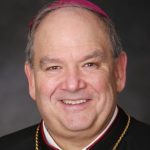Navigating through the crowds at Allianz Field for the Tommie-Johnnie game, I was amazed by how many faces I recognized among the alumni attending that event. Whether wearing purple or red, many of them are active in our parishes, great supporters of our Catholic elementary and high schools, and generous in their board commitments and in their service of the many Catholic institutions that serve our broader community. It was a powerful reminder for me of the role that our local Catholic colleges and universities have historically played in the life of this local Church, particularly in the formation of our laity.
The first set of Pre-Synod Prayer and Listening Events has confirmed for me that this local Church is particularly blessed with a highly engaged laity. We have averaged more than 300 participants at each of our four parish events, and we were blessed with 150 college students at a targeted focus session and more than a 100 deacons and their wives at a second. On top of that, more than 1,200 individuals have already gone through the training for serving as parish synod ambassadors. And we are just at the beginning!

I remain encouraged that so many would be willing to give up an evening or morning to be part of the synod process. The participants have been wonderfully articulate, their demeanor respectful of others, and their comments thoughtful. It is clear that they care deeply about the Church. While they have a wide variety of opinions concerning how the archdiocese should be addressing the challenges of the day, they seem to be unified in their desire to have some role in both determining the next steps and ensuring that those steps be successful.
In many ways, the blessing of such generous and motivated laity is very much the product of the seeds sown by our first archbishop, John Ireland. Anticipating by more than a half century the teaching of the Second Vatican Council on the lay faithful, Archbishop Ireland, a strong leader in his own right, recognized that lay leadership is crucial for the Church’s credibility in society.
In her excellent doctoral dissertation, “The role of the laity in the thought of John Ireland,” Sister of St. Joseph of Carondelet Katherine McLaughlin noted that the Lay Congress of 1889 had a lasting impact on Archbishop Ireland, leading him to “a much stronger sense of standing shoulder to shoulder with the laity, acting together for the good of the Church and the world.”
That transformation in the thinking of Archbishop Ireland was long-lasting, and he persisted in his call for an active laity. Speaking at the installation of the archbishop of Dubuque in 1901, he observed that: “Where the laity rest satisfied with the hope of personal salvation, with hearing Mass and receiving the sacraments, where they fold their arms in indolent indifference and refrain from active participation in works of religion, there the Church can never prosper.”
Archbishop Ireland’s support of St. Thomas (which he founded) and St. Catherine (founded by his sister, Sister of St. Joseph of Carondelet Seraphine Ireland) was very much related to his understanding of the role of the laity. As he indicated in a speech given at South Bend to mark the 50th anniversary of the founding of Notre Dame, Archbishop Ireland opined that the mission of Catholic higher education was “…to provide leaders to the Catholic laity,” noting that “[t]he laity are the Church as the world sees it.”
Today, that work of forming Catholic laity to be leaders is embraced not only at historically Catholic universities but also at Catholic campus ministry programs. I was recently privileged to celebrate Mass at St. Lawrence Catholic Church and Newman Center at the University of Minnesota on the occasion of the canonization of St. John Henry Newman and was delighted to experience a vibrant community. It brought back wonderful memories of my own time as a Newman Center chaplain at Slippery Rock University in Pennsylvania.
The work of forming lay leaders in this archdiocese is by no means restricted to college campuses. In addition to the faith formation programs offered in our parishes and Catholic schools, hundreds of lay leaders and future lay leaders are benefiting each year from the exceptional work that is undertaken at The St. Paul Seminary’s Archbishop Flynn Catechetical Institute and its related programs, the School of Prayer and the School of Discipleship.
I am equally encouraged by the excellent programs offered directly by the archdiocese: I think, for example, of the catechetical and leadership programs offered by our Office of Latino Ministry and the programming offered for adult formation by the Archdiocesan Office of Evangelization and the Office of Marriage, Family and Life.
While the opportunities already offered for lay formation and leadership training are significant, I can share with you that the first four Pre-Synod Prayer and Listening Events have all surfaced a hunger for even greater opportunities in this area. I hope that you will come to one of the 16 remaining prayer and listening events to continue this conversation and share with me your ideas for guaranteeing that this local Church would continue to be blessed with such strong laity.



